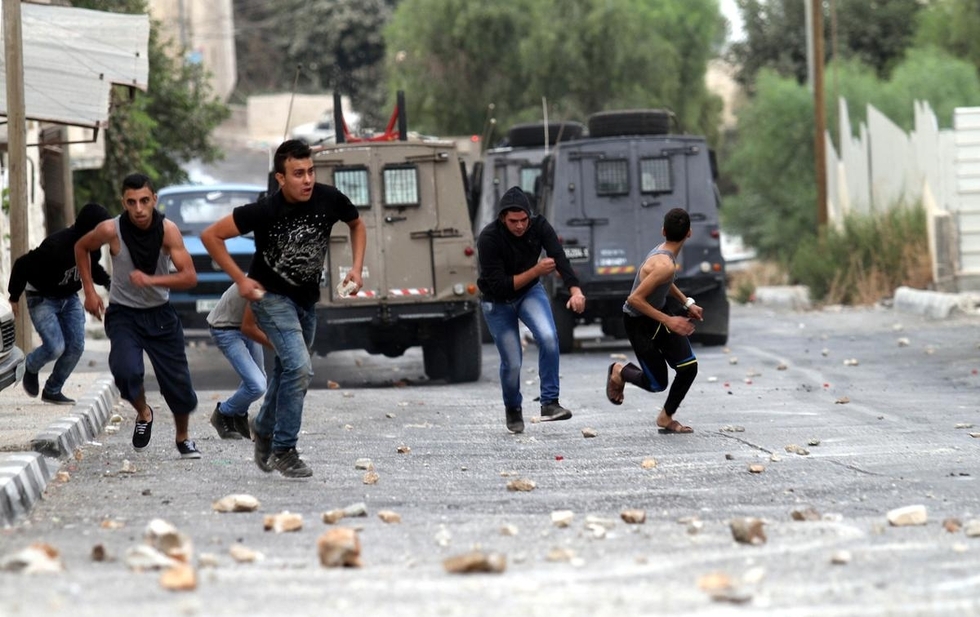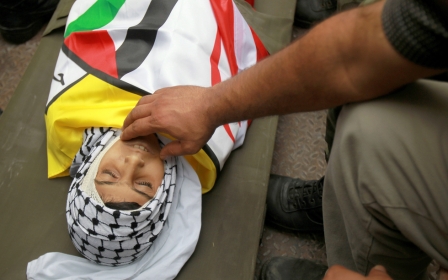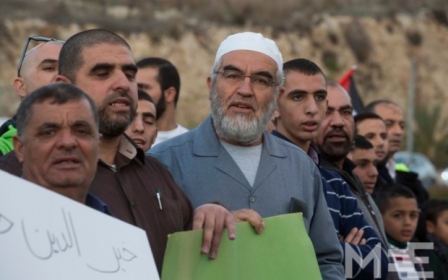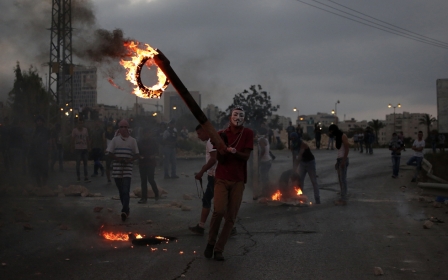Why be afraid of an Intifada?

One telling meme has been circulating on social media over the past week: “My name is Fadi. I’m 19 years old. I was being pursued by Israeli settlers. So I rushed to the Israeli police for help. They shot me dead.” Along with the meme, the videotape of the killing of Fadi Alloun, as the settlers who had pursued him chanted “Death to Arabs,” has gone viral.
Alloun’s death is symbolic of the predicament West Bank Palestinians find themselves in, in their own occupied land, where they are hounded by armed settlers, who have the full protection of the Israeli military, while the Palestinian Authority, in charge of “coordinating security” with the Israeli forces, fails yet again at protecting its citizens.
Since Alloun’s death, five more Palestinians have been killed, over 175 Palestinians injured, and scores detained, as violent clashes with the Israeli military spread throughout the West Bank. More are expected to fall victim to this latest round of “fierce clashes,” as Prime Minister Benjamin Netanyahu has promised an “all-out war” on Palestinians, who continue to take to the streets. The escalating violence has given rise to talk of a “third Intifada,” with various politicians and some media warning about such a development, as if it were to usher a significant deterioration in the living circumstances of Palestinians in the West Bank.
Is a Third Intifada in the making? How exactly does one define or recognise an Intifada, that Arabic word that has entered Western discourse, finding its way into the Merriem-Webster’s dictionary, and now in currency with the #BlackLivesMatter movement, who use it to describe the grassroots rebellion against law enforcement violence in the US? And why would an Intifada be a negative development, something to fear, if it is indeed a rebellion, an uprising, against a racist, brutal, murderous, occupying juggernaut?
Which begs the question, how does one understand an “all-out war” on the Palestinians, as distinct from the murderous violence Israel engages on a daily basis? Is the seven decades-long violation of the most basic human rights of a people not “an all-out war” against that people, when it is implemented through apartheid, dispossession, disenfranchisement, home demolitions, restrictions on freedom of movement, all-encompassing structural violence, and, in Gaza, a siege that is tantamount to genocide?
Any journalist covering Palestine/Israel knows it is extremely easy at any given time to give an exact count of Israeli casualties, if any, over the previous week, even as it is quasi-impossible, at that same time, to give any more than an approximation of Palestinian casualties. Do we count Palestinians who die of malnutrition as “casualties?” What about those who die due to lack of access to healthcare? What about miscarriages as a result of stress? And what words do we use to describe the situation in Gaza, in between the recurrent vicious land, air, and maritime assaults Israel refers to as “mowing the grass?”
How does one define “low intensity conflict,” as distinct from “all-out war?” Would the people of, say, England or the US consider the circumstances of Palestinians under occupation, in those periods not identified “all-out war,” livable? Why, then, the “fear” of an intifada? Is it a fear of a change in the status quo that politicians are invested in, a status quo of peace talks that never translate into peace, road maps that lead to nowhere, while the military industrial complex grows ever more murderous?
“What possibly awaits us here is something like a new intifada,” said Martin Schafer, spokesperson for the German Foreign Ministry. “That can’t be in anyone’s interest – it can’t be something anyone in Israel wants, or which any responsible Palestinian politician wants.”
But here’s part of the problem: truly responsible Palestinian politicians are not at the political helm. The so-called “Palestinian Authority” of Mahmoud Abbas is not responsible for the safety of the Palestinian people, it is not accountable to the Palestinians, it is a sub-contractor of the occupation. Like most politicians, Abbas is more invested in the process, than in genuine peace. “Responsible Palestinians” are the civilians who persevere in their dogged attempts to survive, to go to school, to work, feed their families, have dreams and ambitions, be free, be sovereign. Responsible Palestinians rebel against injustice and violence.
Intifadas are good. They reveal to the world that Palestinians have not, will not, acquiesce to their oppression. The third intifada must be against the ongoing occupation as undertaken by the Israeli forces as well as their sub-contractor, the Palestinian Authority. Only then will the farce of Peace Accords and Road Maps be finally tossed into the trash heap of history, where it belongs.
An escalation in Israeli violence, both "state violence" and "state-facilitated settler violence," along with an escalation in angry Palestinian resistance - because there is always resistance, but it changes qualitatively, in response to escalating Israeli violence - do not necessarily make for a Third Intifada. Yet the right mix of elements are there, the climate is ripe, and an intifada may indeed be brewing. The hope - not fear - is that this time, it will be against both Israel and all involved in the farce that is the “peace talks”. It is time for action.
- Nada Elia is a Diaspora Palestinian writer and political commentator, currently working on her second book, Who You Callin' "Demographic Threat?" Notes from the Global Intifada. A professor of Gender and Global Studies (retired), and is a member of the Steering Collective of the US Campaign for the Academic and Cultural Boycott of Israel (USACBI)
The views expressed in this article belong to the author and do not necessarily reflect the editorial policy of Middle East Eye.
Photo: Palestinian youths throw stones at Israeli military vehicles as Israeli soldiers carry out a raid in the West Bank city of Nablus, on October 06, 2015. (AA)
New MEE newsletter: Jerusalem Dispatch
Sign up to get the latest insights and analysis on Israel-Palestine, alongside Turkey Unpacked and other MEE newsletters
Middle East Eye delivers independent and unrivalled coverage and analysis of the Middle East, North Africa and beyond. To learn more about republishing this content and the associated fees, please fill out this form. More about MEE can be found here.





